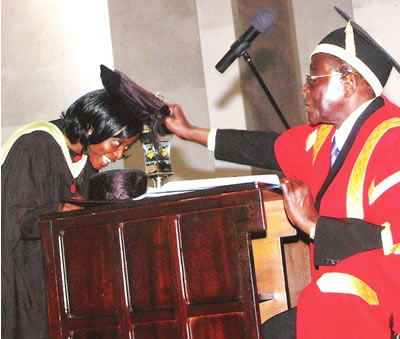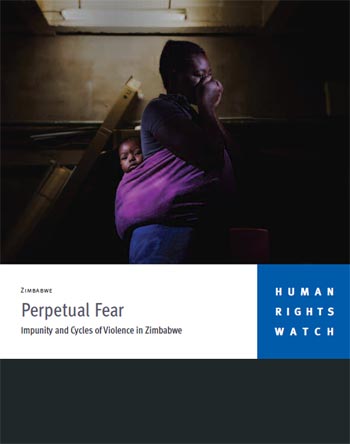
By the end of my graduation day from Zimbabwe’s National University of Science and Technology (NUST), the 22nd of October 2010, all I could say was this was one of my best days ever! Just to see my siblings, relatives and friends with these huge smiles because I had made them proud made me feel like a little princess. I felt honoured to have His Excellency President Robert Mugabe cap me. I couldn’t even hide my smile when I heard him say, “Congratulations”. However, in the midst of celebrating and having fun my mind went back on a journey 5 months ago.
Monday the 31st of June 2010.
Exams were scheduled to start on that day at 9.00am. As usual students had spent the whole month, week and the weekend preparing for papers they were going to sit for. Not known to them was the fact that they weren’t going to do so. As students approached the examination hall, to their disbelief they were told that ‘only students with zero balance statements’ for their accounts were allowed to enter the examination room. Which meant one had to have cleared all their fees.
Students were baffled. I mean there was total chaos. Per semester fees range from $315 to $815 depending on the programme and whether one is in the convectional or parallel class.
A very few ran to the bursar’s office to collect their statements. I remember that only 10 students wrote their exam for a department in my faculty that had an exam on that particular day. Of the 10, many confessed that they only managed to enter by mere luck because the guard did not closely look at their statements. A few also managed to get in one and half hours late for a three-hour paper.
The majority, who did not make it into the examination room for their exams, stood by the entrance gate hoping for a miracle of some sort to take place. When they realised that nothing was going to happen, as the university’s authorities and security insisted they were not going to enter, they cried. It was so pathetic to see them and others, myself included, who did not have an exam that day cry at university. As final year students we wept, these were our last exams before graduating and we did not want to have our stay prolonged at the university.
All the time spent at university – for some four to seven years (depending on the programme) – seemed to be going down the drain just when you could smell the coffee.
Here’s a bit of background on fee paying at university. For final year students the situation was bad. In the first semester fees had to be paid in Zimdollars and in the second semester dollarisation had taken place which meant we had to pay fees in foreign currency. That we did. However, when we got to campus to commence our first semester for our final year we were told that semester which we had paid Zimdollars for had been dollarised which meant we had to pay US dollars for it! The case was taken to court and the university authorities requested that students bring receipts showing payments made in Zimdollars together with their registration forms. Some students had lost their receipts and upon going to their respective departments to get their registration forms, some departments resorted to playing hide and seek with the papers.
I didn’t have an examination that day, but still my first exam was on Tuesday the following day at 9.00am. I got my statement from the bursar’s office stating that I owed the university US$485.00 which meant I had 24 hours to get that money and pay. You cry but you reach a time when you realise that tears won’t bring you anything. My parents are late, so I had to get in touch with my sisters and a few immediate relatives. They were all similarly shocked and ran around, but still they weren’t going to be able to get the money to me before 9.00am the following day. Luckily for me I was renting a house with first year students, my younger brother included, and their exams were scheduled to start two weeks later and because they were first years they were not implicated in the Zimdollar saga. Thus I borrowed money from them and also from a friend. I went and paid the balance before the exam with borrowed money, which meant I was in debt.
The following day police were all over campus and this was really intimidating. As I got my ‘zero balance statement’, I made my way to the examination room. A room, which is usually full, was literary empty. It was painful to see that the candidate, who sits behind you or in front or beside you, did not make it. I felt the coldest breeze pass over me not only because the room is exceptionally cold but also from having fellow students absent. We waited for nearly an hour hoping that other candidates would join us but only a few joined in after that hour had passed.
When it was time to start writing the exam, I realised my mind was blank. This was because instead of preparing for the exam the previous day, I had spent my time worrying and in tears. I had also spent my time visiting relatives around town, ‘begging’ for money. I had spent the day recounting the few notes I had and rechecking my statement to see if any miracle had taken place. I had spent the day with my phone in my hand, calling this person and the next.
Thus on my graduation I was over the moon not only because I had managed to endure the sleepless nights of reading and working on a dissertation, but because I had managed to sit for exams. Its sad to know that some students had to defer their studies because of the very short notice we were given to clear the fees balance.
I not only left the university on graduation day with a BSc degree but also with survival skills.












